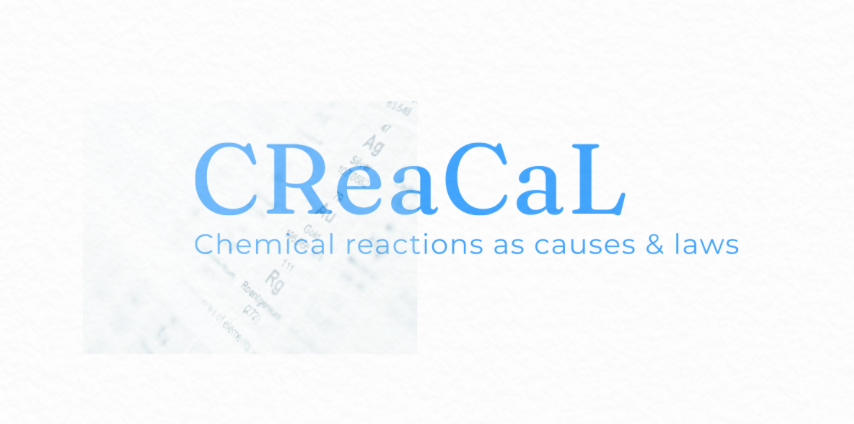top of page
Jg

Essays


The chemical bond: The biggest chemical paradigm, or the greatest chemical uncertainty?
How should we define the chemical bond?

Sebastian Kozuch
Sep 4, 20254 min read


Chemical reactions as causes? (part III)
In this final article prompted by the work done during the research project "Chemical Reactions as Causes and Laws", I would like to present some of the problems and challenges that I encountered when attempting to analyse chemical reactions in a philosophically informed way.

Vanessa Seifert
Aug 11, 20254 min read


Chemical reactions as causes? (part II)
Some further thoughts on the nature of reactions

Vanessa Seifert
May 14, 20254 min read


Chemical reactions as causes?
Investigating chemical reactions philosophically can shed light into our understanding of their nature in ways we haven't thought of before.

Vanessa Seifert
Nov 18, 20244 min read


Control strategies in the discovery of Argon
Control strategies were integral parts of the research that led to the discovery of Argon.
Vasiliki Christopoulou and Theodore Arabatzis
Nov 5, 20245 min read


Designing and predicting proteins – Why is the Nobel Prize for Chemistry so intriguing?
What is so fascinating about this year's Nobel Prize in Chemistry?

Francesca Bellazzi
Oct 19, 20244 min read


What are Molecules and are Molecules Made of Atoms?
The question which forms the title of this essay is simple enough and, to my mind, merits a simple and unequivocal answer: yes.

Nicholas C. Norman
Aug 17, 20247 min read


Bridging the gap between chemistry and society: natural and artificial from a history of flavour’s perspective
How studying the history of synthetic flavouring agents can help us understand science, industry, society and the relations between them.

Paulina S. Gennermann
Jul 5, 20245 min read


Putting the Senses to Chemical Use
Despite the modernisation brought about by the "New Chemistry", the senses have continued to play an important role in chemical practice.

Armel Cornu
Oct 18, 20235 min read


Kuhn, the Discovery of Chemical Elements, and the Social Nature of Scientific Inquiry
Thomas Kuhn discusses the Chemical Revolution in some detail in The Structure of Scientific Revolutions, that is, the great changes in...

K. Brad Wray
Aug 28, 20235 min read


Let’s promote a feminist philosophy of chemistry!
In this post, Vanessa Seifert reflects on some interesting questions to pursue in the context of a feminist philosophy of chemistry

Vanessa Seifert
Mar 10, 20234 min read


The Ardystil Syndrome Case: when chemicals cross through textile factory, hospital and laboratory
In the Ardystil occupational intoxication case, interactions with chemical changed according to the different contexts.

Sofiya Kamalova
Sep 26, 20227 min read


Genes: from instruments of thought to the base of life
Does the way we think about scientific entities matter to scientific practice?

Francesca Bellazzi
Sep 7, 20225 min read


How do we know when water is safe to drink? The early modern origins of water analysis
Before plumbing infrastructure reached most homes, chemistry was crucial in developing a method to evaluate the safety of drinking water.

Armel Cornu
Aug 23, 20227 min read


The contributions of Geoffrey Blumenthal: From Copernicus’s astronomy to Lavoisier’s chemistry
The contributions of Geoffrey Blumenthal to the history and philosophy of science
James Ladyman & Vanessa Seifert
May 24, 20225 min read


The superpowers of proteins
Nowadays we all care about our proteins. Supermarket products proudly show the amount of proteins they contain and we are all somehow...

Francesca Bellazzi
May 5, 20226 min read


Beyond Cartesian Mechanicism: Robert Boyle’s Chemical Philosophy
Central themes of Marina Paola Banchetti-Robino's book "The Chemical Philosophy of Robert Boyle: Mechanicism, Chymical Atoms, and Emergence"

Marina Paola Banchetti-Robino
Apr 15, 20225 min read


Was the Invention of Agent Orange an Invention at All?
Agent Orange was born from the knowledge that certain known substances kill plants. But could this knowledge claim constitute an invention?

Alison McManus
Feb 14, 20228 min read


The True Story of How a False Theory Led to the Discovery of Boron
Can false theories successfully predict previously unknown phenomena? This post discusses one such example: the discovery of boron.

Jonathon Hricko
Jan 20, 20224 min read


Understanding chemical substance (is harder than you might think)
What is a chemical substance? In this post, Marabel Riesmeier argues that answering this question is more complicated than one might think.

Marabel Riesmeier
Nov 26, 20215 min read
bottom of page